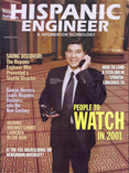The "Digital Divide" -- the disparity between those who have access to information and new technologies and those who do not -- disturbingly impacts vulnerable populations in economically depressed urban and rural areas of the U.S. Most of those adversely affected are people of color, specifically Latinos and African Americans. Hispanics are still half as likely to own a computer as White households and nearly 2.5 times less likely to use the Internet. In fact, Latinos are less likely to have access to the Internet from any location -- whether that be at home, school, work, or the library -- than Whites are from home.
We know that people who have access to personal computers and high-speed Internet technologies are able to engage in the "New Economy" through distance learning, e-commerce, business-to-business transactions, political discourse, global communications, and entertainment services. Schools with access to this technology can ensure they are prepared for the 21st century work force their students will eventually join. Yet schools serving predominantly low-income children are still underserved, despite some technological improvements, and are less likely to have access to high-speed data service, because the cost to install it is prohibitive for the companies that have the capacity to do so.
Moreover, the divide may exacerbate the problems of people who already lack affordable health care, satisfactory employment, and decent housing. New technological advances such as telemedicine, local and distance learning, and telecommuting, among other applications, are possible through emerging high-speed, high-capacity networks that permit users to send and receive voice, data, graphics, and video using telephone, cable, or wireless technologies. The availability of these "broadband networks" can connect people and help communities address some of their pressing problems, but only if the networks reach everyone, everywhere.
Without policies in place that ensure nondiscriminatory access to our communication networks, the most vulnerable sectors of the population, who could benefit the most from these applications, may be further disadvantaged. LULAC believes that it is important, therefore, to ensure, to the extent that it is possible, to all people of the U.S. -- regardless of race, color, national origin, income, residence in rural or urban area, or disability -- high-capacity, two-way communications networks.
Current broadband policy is inadequate. It does not permit regulatory parity or provide promising options to promote adequate investment in all broadband technologies. And, under current financial and regulatory conditions, the disparity between those who have access to the next generation of broadband capabilities and those who do not will grow even further.
There are efforts in Congress to pass legislation that would move government into the development of a national policy that applies a common-carrier regulatory framework to all broadband telecommunications markets, including the cable broadband market. The Broadband Internet Access Act, first introduced in 2000 and reintroduced in 2001, promises possibilities. It offers a temporary tax credit for the deployment of high-speed Internet access to rural America and underserved, low-income urban areas and creates a market-based incentive to create the infrastructure to bridge the Digital Divide.
LULAC supports this endeavor because the legislation does not favor any particular company or technology. Rather, it fosters competition among all classes of carriers -- whether they be telephone companies, cable operators, wireless providers, or satellite providers. The legislation creates a win-win situation for the private sector and for consumers, and especially for Latinos. It represents a public policy that encourages the private sector to invest in underserved communities and helps to level the playing field for all U.S. residents.
Gabriela D. Lemus, Ph.D. is director of policy and legislation for the League of United Latin American Citizens. Please send your comments about this article to Vista@ccgmag.com

